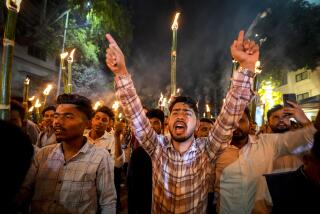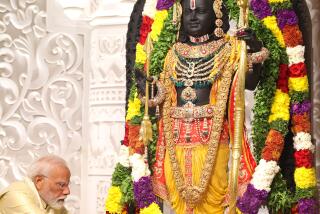Pakistani Hindus’ ashes brought to India to be scattered in Ganges
They sat in the dark for decades, waiting on the shelves of an abandoned library, the laughter and tears that once defined their lives all but forgotten.
Dictatorships rose and fell. India and Pakistan detonated atomic bombs. All the while, the ashes were housed in Karachi’s Hindu Cremation Ground, a several-acre legacy of the shrinking Hindu community in majority-Muslim Pakistan.
Finally, after years of lobbying and bureaucratic setbacks, the remains of 135 Hindus who had died as long ago as the 1950s were recently placed in clear disposable boxes (to appease wary customs officials) and allowed a final journey over a tense border to be scattered in India’s Ganges River, which Hindus hold sacred.
During the three-day trip aboard Indian and Pakistani trains, an earthquake rocked both nations — a clear sign, said Hindu devotees who accompanied the remains, that the souls had awakened and were ready for the next world.
The transfer, reportedly the first on a large scale since the wrenching 1947 partition that created Pakistan out of the collapsing British rule in India, spotlights a community caught in the middle of a political and religious divide in troubled Pakistan. Hindus increasingly have been targeted by mobs, kidnappers and extortionists as Islamic fundamentalism and lawlessness have spread.
Caretaker Murad Buksh, 63, whose family has tended these cremation grounds for generations, looked over shelves holding urns that have accumulated in the last few months — those with red shrouds bound for India on a second trip, which could be as early as September; those in white to be scattered locally, many in Pakistan’s Indus River, which is said to have “sweet waters” similar to the Ganges’.
The cremation grounds, built in the 1880s in a then-rural area to serve the Hindu population, are now hemmed in by Karachi’s teeming population and ringed by 10 mosques. Hindus, who accounted for 15% of Pakistan’s population at partition, now make up just 2% of its 170 million people as emigration and forced conversions take their toll.
In the lead-up to partition, many Hindus in what became Pakistan relocated to Hindu-majority India and many Muslims in India moved to the Islamic Republic of Pakistan. But significant numbers on both sides stayed put. In a bid to reassure Hindus, Pakistan’s founder, Mohammed Ali Jinnah, said their rights would be respected, a promise that many feel has since been betrayed.
Ideally, Hindus cremate their relatives’ bodies and scatter them in the Ganges. Although many Pakistani Hindus chose to scatter their relatives’ remains locally after partition, some families left their loved one’s ashes at the cremation grounds hoping by some miracle they’d one day reach India, and join their parents’ and grandparents’ ashes in the sacred waters.
Several years ago, Karachi-born Hindu priest Ramnath Mishra teamed up with New Delhi’s Shri Devo Uthan Sewa Samiti, a religious civic group, to try to make that miracle happen.
Initially, they were stonewalled by officials on both sides. But then the civic group’s general secretary, Vijay Sharma, got the Indian media interested, increasing the political pressure. In January, after enough time had passed since the deadly 2008 Mumbai attack that India blames on Pakistani militants, they received the go-ahead. A delegation of 12 Pakistani Hindus accompanied the remains, transported in the trains’ overhead luggage racks.
“They’re quite heavy,” said Mishra, whose family has for 1,500 years, he says, tended a Hindu temple linked to the Karachi burial grounds, “not only physically but from the weight of their souls.”
They arrived in New Delhi on Jan. 21, then waited three weeks for an auspicious date before heading with a band and hundreds of well-wishers to Haridwar, about 115 miles to the northeast, for the ceremony. There, the ashes, mixed with milk and flower petals, were scattered in the Ganges.
“I felt such elation and honor that I could help bring these souls long separated by partition to the banks of the Ganges,” Sharma said. “If both sides would allow regular trips for Hindu ashes, it could help both countries respect each other’s religion.”
Back in Karachi, fewer Hindus these days come to the cremation grounds, where bodies are burned in sunken ash pits, Mishra said, explaining that they are increasingly concerned about being attacked in a country where Christian and minority Muslim sects also are fearful. On some days, several hundred Hindus, including women and children, enter India from Pakistan on pilgrim visas hoping they’ll be allowed to stay.
Local Hindus say the cremation grounds are coveted by the Muslim majority. A few years ago, the city government appropriated four acres for a highway overpass, promising compensation that never came, Hindus here said.
The construction destroyed boundary walls, leading to the desecration of some of the grave sites that dot the area. During a state program to help rebuild the grounds, workers and passersby stole water tanks, smashed fences, cut electrical wires and poured ashes out of metal urns so they could sell the containers, Mishra said.
Caretaker Buksh, a Muslim, said he doesn’t mind handling Hindu bodies or being on the grounds among the dead. “Collecting the wood, burning bodies — it’s a job,” he said.
Others are less open-minded. “I don’t remember a time when Hindus and Muslims lived in peace,” said Nooruddin Bharucha, a shop owner in Karachi’s Mithadar neighborhood. “It’s OK to do business with them. But they’re blasphemers, and that’s unacceptable to us.”
As intolerance has spread, Hindus living in rural areas have become particularly vulnerable to land appropriation, extortion and having their daughters kidnapped and then being told that they ran away with a Muslim and willingly converted, said Ramesh Kumar, director of the Karachi-based Pakistan Hindu Council. Complaints to the police or courts are routinely ignored, community leaders said.
“Because we’re Hindus and a minority, they think we’ll just take it,” Mishra said. “And no one comes to our aid. We’re increasingly vulnerable.”
Somewhat ironically, Pakistani Hindus who move to India find they’re also discriminated against given their association with Pakistan.
Maharaj Lukhmi Chand, 83, a Hindu priest, was recently kidnapped near Khuzdar in the western province of Baluchistan and held by unknown captors for more than two weeks before his negotiated release. He’s frustrated that even though he’s been a victim of apparent religious extremism in Pakistan, he’s viewed with suspicion by Indian Hindus.
“We’re treated as traitors in India,” Chand said. “And our community here in Pakistan is over a million people. Not everyone has the resources to move.”
More to the point, many Hindus consider Pakistan their home despite all the problems and the increased attacks every time relations with India deteriorate.
“My father and grandfather lived here,” said Rajish Kumar, 25, resting in the shade of a tree at Karachi’s Shri Swami Narayan Temple. “This temple, where we live surrounded by Muslims, is our enclave.”
At the cremation grounds, caretaker Buksh took a last look around the crypt before snapping the lock shut.
“I believe it’s the right thing,” he said of the ashes bound for the Ganges. “They need to find peace. They should be able to go to India.”
More to Read
Start your day right
Sign up for Essential California for news, features and recommendations from the L.A. Times and beyond in your inbox six days a week.
You may occasionally receive promotional content from the Los Angeles Times.





